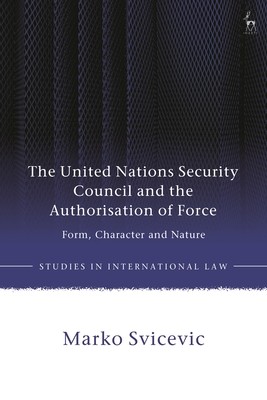
- We will send in 10–14 business days.
- Author: Marko Svicevic
- Publisher: Hart Publishing
- ISBN-10: 1509971254
- ISBN-13: 9781509971251
- Format: 15.6 x 23.4 x 1.6 cm, kieti viršeliai
- Language: English
- SAVE -10% with code: EXTRA
The United Nations Security Council and the Authorisation of Force (e-book) (used book) | bookbook.eu
Reviews
Description
This book examines the United Nations Security Council's authorisation of the use of force, considering the extensive body of UN Security Council resolutions across its now 8 years of existence.
As one of the established exceptions to the Article 2(4) UN Charter prohibition on the use of force, UN Security Council authorisation of force remains a key focus for both States and scholars alike. Despite the apparent consequences of authorisation, authorising resolutions lack prescribed formats or mandatory content. The UN Security Council has, however, developed a consistent practice of prior explicit authorisation. UN Security Council practice overwhelmingly shows that authorising resolutions explicitly determine a situation a threat to international peace and security, invoke Chapter VII (or VIII), use specific authorising language, place time or functional limits on authorisation, and impose reporting obligations on those authorised to use force. The book ultimately argues that prior explicit authorisation constitutes a well-established practice, rejecting the legality and admissibility of implicit or retroactive authorisation.EXTRA 10 % discount with code: EXTRA
The promotion ends in 23d.22:53:12
The discount code is valid when purchasing from 10 €. Discounts do not stack.
- Author: Marko Svicevic
- Publisher: Hart Publishing
- ISBN-10: 1509971254
- ISBN-13: 9781509971251
- Format: 15.6 x 23.4 x 1.6 cm, kieti viršeliai
- Language: English English
This book examines the United Nations Security Council's authorisation of the use of force, considering the extensive body of UN Security Council resolutions across its now 8 years of existence.
As one of the established exceptions to the Article 2(4) UN Charter prohibition on the use of force, UN Security Council authorisation of force remains a key focus for both States and scholars alike. Despite the apparent consequences of authorisation, authorising resolutions lack prescribed formats or mandatory content. The UN Security Council has, however, developed a consistent practice of prior explicit authorisation. UN Security Council practice overwhelmingly shows that authorising resolutions explicitly determine a situation a threat to international peace and security, invoke Chapter VII (or VIII), use specific authorising language, place time or functional limits on authorisation, and impose reporting obligations on those authorised to use force. The book ultimately argues that prior explicit authorisation constitutes a well-established practice, rejecting the legality and admissibility of implicit or retroactive authorisation.

Reviews